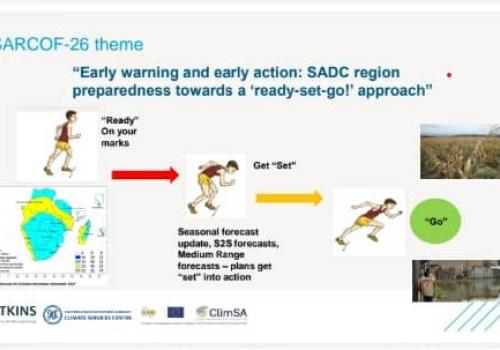The Southern African Development Community Climate Service Centre (SADC CSC) is taking the Southern African Regional Climate Outlook Forum (SARCOF) towards a ‘ready-set-go’ approach which emphases on users incorporating climate outlook in their contingency plans to raise levels of preparedness required prior to the wet season of 2022/2023.
This was said by Dr Patrice Kabeya, Officer-In-Charge of the SADC Directorate of Infrastructure at the opening of a three-day SARCOF 26 virtual workshop which ran from 24th – 26th August 2022 under the theme “Early warning and early action: SADC region preparedness towards a ‘ready-set-go!’ approach”.
Dr Kabeya said this readiness approach based upon seasonal guidance can enable regional agencies and other stakeholders to mobilise resources across the Region, and that at the same time local actors may get “set” and begin their initial preparations. Much closer to the time of the climate impact, appropriate actions will be taken directly and this reflects the “go!” phase. He said this approach will be further facilitated by having access to the relevant climate information as the season progresses.
The approach draws together the regional providers of SADC CSC, regional actors and agencies, National Meteorological and Hydrological Services (NMHSs) and their associated stakeholders. For this to be effective stakeholders must be clear on where, when and how to access climate information.
Dr Kabeya said such an approach is becoming more and more relevant within the SADC Region which is already experiencing the devastating effects of climate change. The 2021/2022 rainfall season saw six cyclones which affected several SADC Member States, including Madagascar, Malawi, Mauritius, Mozambique, South Africa, Zambia and Zimbabwe. The tropical storms and cyclones brought heavy rains and strong winds, causing significant flooding and landslides, and resulting in fatalities, displacements, destruction of infrastructure and flooding. The season also experienced unprecedented floods in some parts of South Africa.
The SARCOF, now convened for 26 years this year, is a platform that brings together national, regional and international climate experts and stakeholders from countries with common interests to provide climate predictions based on input from NMHSs, Global Producing Centres for Long Range Forecasts and other climate prediction Centres.
Additionally, another objective of the forum is to execute the ClimSA Programme. The ClimSA Programme takes place within the framework of an existing Financing Agreement between the African, Caribbean and Pacific (ACP) group of states and the European Union. It has been approved under the intra ACP Cooperation 11th European Development Fund Strategy Paper and Indicative Programme (2014-2020) programming actions for the ACP regional organisations/institutions and countries.
In the SADC Region the ClimSA Programme is implemented by the SADC Secretariat through the Climate Service Centre (CSC), together with the programme’s implementing partners, World Meteorological Organisation (WMO), Joint Research Centre (JRC), EUMETSAT (the European operational satellite agency for monitoring weather, climate and the environment from space), and the Organisation of African, Caribbean and Pacific States (OACPS) Secretariat, which aim to develop the User Interface Platform (UIP) and mainstream the climate services to specific sectors in the SADC Region. The SARCOF platform is a vital component of the UIP and a key platform for delivering climate services to stakeholders.
This year the virtual Climate Expert Meeting that is the pre-SARCOF-26 meeting was conducted from 15 to 23 August and it brought together over 50 climate experts from NMHSs to contribute towards building a consensus regional seasonal forecast of the upcoming rainfall season 2022/2023. This meeting also provided an opportunity to build the capacity of national climate experts on climate forecasting using an updated version of the Climate Forecasting Tool (CFT) and Climate Prediction Tool (CPT).
The SARCOF 26 workshop was attended by directors and permanent representatives of NMHSs with WMO, climate experts from NMHSs of the SADC Member States, and representative of the WMO, the African union Commission, ClimSA partners, African Centre for Meteorological Applications for Development (ACMAD), and the Famine Early Warning Systems Network (FEWSNET).

